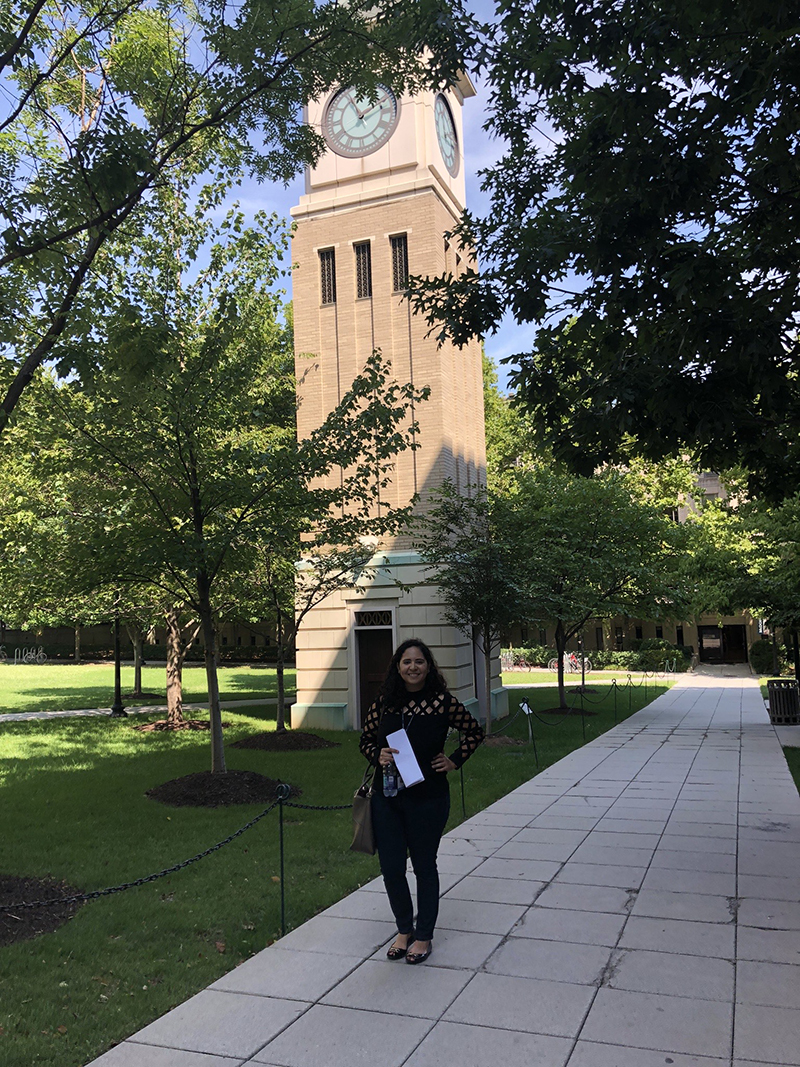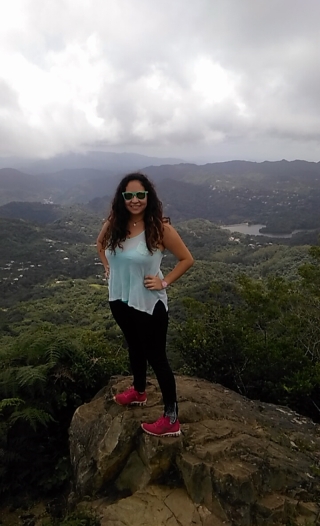Knauss legislative fellowships in Congress help build careers — and they're fun and educational. See our video and fact sheet for details.
Maryland Sea Grant Welcomes First Law Fellow
Elissa Torres-Soto grew up six miles from the ocean, on the western side of Puerto Rico, snorkeling in blue waters and hiking along sandy beaches.
She will spend the next year near a different coastline—the Chesapeake Bay—as Maryland Sea Grant’s inaugural law fellow. Torres-Soto will be based at the Wye Research and Education Center on Maryland’s Eastern Shore, where the University of Maryland Agricultural Law Education Initiative (ALEI) is based. The initiative includes legal and extension specialists who help farmers understand and comply with state, federal and local laws and regulations, as well as educate growers and producers on relevant laws and available resources. Torres-Soto, in her role with Sea Grant, will focus on aquaculture and related communications as part of the fellowship.
Torres-Soto majored in political science and law at the Pontifical Catholic University of Puerto Rico, graduating with a BA in 2015. The Deepwater Horizon oil spill happened in the Gulf of Mexico while she was an undergraduate student, which made her consider focusing on environmental law as a career.
However, she felt herself drawn to the study of constitutional law when she started law school. Soon, she secured a summer internship with the island’s Superior Court investigating court orders and helping the government build its cases in preparation for that type of work. Then, Hurricane Maria devastated the island, and she found herself pulled back to the idea of applying her law skills to improve coastal resilience. She graduated from Pontifical Catholic University of Puerto Rico’s School of Law with a JD in 2018, and with unemployment high on the island, she decided to look toward Washington, DC.

She applied to two Masters of Law (LLM) programs, which allow lawyers to further specialize in specific areas. One program focused on constitutional law at The George Washington University, while the other centered on environment and energy law at the Georgetown University Law Center. When she was accepted to both programs, she had to choose. She thought about what she saw in the aftermath of Hurricane Maria—the ambulances that couldn’t navigate the debris-strewn streets, the lack of communication that lasted weeks, the long wait for assistance and the people who had to bury loved ones in their own backyards—and kept coming back to the importance of coastal resilience for communities.
“To me, the most important lesson from Maria is that weak government structure and a lack of a plan and resilience can be devastating,” she said. “I don’t want anybody to go through what we had to go through.”
During her year in DC, Torres-Soto missed the beaches of her childhood, but she enjoyed an internship with the Environmental Protection Agency in the general counsel’s office that focused on environmental law. When her program went virtual in March, she returned to Puerto Rico. She joined Maryland Sea Grant earlier this fall after a competitive search for a law fellow, which some of the 34 Sea Grant programs already have. Funding for the program comes from the National Sea Grant Law Center, which assists constituents nationwide with legal information, analysis, and outreach related to coastal and ocean law issues.
Housed at the University of Mississippi School of Law, the National Sea Grant Law Center was established in 2002 to “coordinate and enhance Sea Grant's activities in legal scholarship and outreach related to coastal and ocean law issues,” according to its website. Recently, there has been a drive to expand legal capacity in individual Sea Grant programs across the country, and Maryland Sea Grant has been fortunate to benefit from this emphasis and find resources to support its first full-time legal scholar, said Maryland Sea Grant Director Fredrika Moser.
“Elissa brings a rich curiosity about legal issues at the intersection of coastal law and people, based in part from her previous work with Puerto Rican survivors of Hurricane Maria,“ Moser said. “We are pleased to have her bring intellectual talents and compassion to explore important resilience and aquaculture legal questions of concern to Maryland's coastal communities.”
Torres began her work with Sea Grant and ALEI remotely, but has since moved to Maryland, where she is living with her fiancé, who works for the Federal Emergency Management Agency.
She calls the fellowship “an amazing opportunity to learn a little bit about everything” and is currently researching the state’s administrative law process, which handles a lot of hearings on new regulations. She’s also learning how different agencies that connect with agriculture and aquaculture function and make decisions and plans to write some white papers about the areas she’s focusing on. Constitutional law, she said, will always be an interest, but she knows that her time as a fellow will help prepare her for a career in environmental law and that this path is the right one for her–whether she stays in Washington or returns to her island home.
“I always say that knowledge is power,” she said. “Communities that know their rights and know what to ask and where to ask can function so much better.”
Photo, top left: Elissa Torres-Soto at Monte Guilarte, a peak in Adjuntas, Puerto Rico. Courtesy of: Elissa Torres-Soto
See all posts from the On the Bay blog




